Medical Books
-
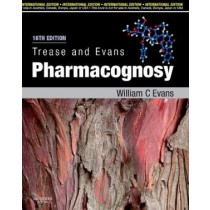
Trease and Evans Pharmacognosy, International Edition, 16th Edition
Pages: 616,
Specialty: Pharmacology,
Publisher: Elsevier,
Publication Year: 2009,
Cover: Book,
Dimensions: 215.9x279.4x20.32mm
Weight: 1.43 KG
Learn More -

Thieme Test Prep for the USMLE®: Learning Pharmacology through Clinical Cases
Pages: 480,
Specialty: Pharmacology,
Publisher: Thieme,
Publication Year: 2018,
Cover: Paperback,
Dimensions: 178x254x22.86mm
Learning Pharmacology through Clinical Cases by Mario Babbini and Sandeep Bansal uniquely integrates the preclinical disciplines, which is crucial for pharmacological problem solving and learning to think critically. Each case portrays a real-life scenario, promoting a bridge from foundational knowledge to its application. A series of USMLE-style questions with thorough explanations guide the reader through a comprehensive understanding of relevant basic science disciplines such as physiology, pathology, and microbiology, followed by a detailed analysis of the pharmacology. Key Features Nearly 50 case studies mirror situations seen in every-day practice In-depth coverage of drugs in the context of specific disease states and clinical situations Comprehensive cases encompass medical/family/drug history, physical examination, lab findings, diagnosis, pharmacotherapy, and follow-up One set of multiple choice questions addresses related basic science content. A second set covers topics related to the pharmacology, such as mechanism of action, adverse effects, and contraindications. This essential, highly practical resource will help medical students build problem-solving skills, assess pharmacology knowledge, and fully prepare for board examinations. show more
Weight: 1.09 KG
Learn MoreOMR28.88 -
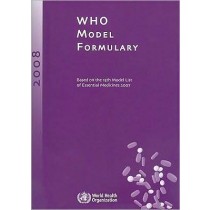
The Who Model Formulary 2008
Pages: 666,
Specialty: Pharmacology,
Publisher: WHO,
Publication Year: 2009,
Cover: Paperback,
Dimensions: 149.86x210.82x38.1mm
Since its first publication in 2002, the "WHO Model Formulary" has become an indispensable source of independent information on essential medicines for pharmaceutical policy-makers and prescribers worldwide. The "Model Formulary" is the authoritative guide on how to make effective use of the medicines on the WHO Model List of Essential Medicines, so improving patient safety, and limiting unnecessary medical spending. For each medicine the "Model Formulary" provides information on use, dosage, adverse effects, contraindications and warnings, supplemented by guidance on selecting the right medicine for a range of conditions.The new edition, "WHO Model Formulary 2008," details changes made to the WHO Model List of Essential Medicines in 2007, with updated therapeutic information on existing medicines reflecting new clinical knowledge.show more
Weight: 0.79 KG
Learn More -
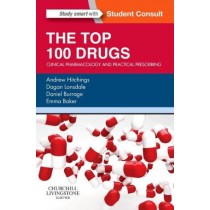
The Top 100 Drugs, Clinical Pharmacology and Practical Prescribing **
Pages: 274,
Specialty: Pharmacology,
Publisher: Elsevier,
Publication Year: 2014,
Cover: Paperback,
Dimensions: 124x188x12mm
Prescribing for the first time is a nerve-wracking experience. Of all the tasks performed by new doctors, it is probably the one with greatest direct impact on the wellbeing of patients. Safe and effective practice rests on a good understanding of both clinical pharmacology and practical prescribing. Acquiring this is not easy, particularly when faced with reams of information about hundreds of unfamiliar drugs, often presented in a way that appears detached from clinical reality. This book is your starting point. It is a direct response to requests from students for a compendium of the 100 most important drugs in the NHS. Key information about the clinical pharmacology and practical prescribing of each drug is presented side-by-side, allowing you to direct your attention as appropriate for your stage of training. Drugs can be accessed alphabetically when you need quick information on the wards and by organ system or clinical indication when you are at your desk. Research led by Professor Emma Baker has identified the 'top 100 drugs' by their importance and prescribing frequency. She has shown that the list changes little over time, making it a stable resource upon which to base learning. "A great practical resource for those new to prescribing the text is aimed at those new to independent prescribing, and for that group I would consider The Top 100 Drugs to be an excellent publication." Reviewed by: Emma Watts, GP in Surrey on behalf of (journal) Pulse Date: April 2015
Weight: 0.24 KG
Learn MoreOMR8.86 -

The Top 100 Drugs, 2nd Edition
Pages: 320,
Specialty: Pharmacology,
Publisher: Elsevier,
Publication Year: 2018,
Cover: Paperback,
Dimensions: 123x186mm
Now in its second edition, this highly successful guide to safe prescribing of the most common classes of drugs is your starting point for safe and effective practice. The first edition was a direct response to requests from students for a compendium of the 100 most important drugs in the NHS. Research led by Professor Emma Baker identified the 'top 100 drugs' by their importance and prescribing frequency. The top 100 drugs and the five most important intravenous fluids are presented using a clear, consistent layout across double-page spreads. Drugs are arranged alphabetically and also listed by organ system and clinical indication, providing multiple pathways into the information. Clinical pharmacology is discussed under the headings: common indications; mechanisms of action; important adverse effects; warnings; and important interactions. Practical prescribing is discussed under the headings: prescription; administration; communication; monitoring; and cost. A clinical tip is presented for every drug. Single-best-answer questions are provided for self-assessment and to show how information from several drugs may be integrated. Double the number of self-assessment questions, from 50 to 100. 11 new drugs added and 11 dropped according the re-run research into the top 100 drugs in current use. show more
Weight: 0.6 KG
Learn MoreOMR10.01 -

The Hands-on Guide to Clinical Pharmacology
Pages: 30,
Specialty: Pharmacology,
Publisher: Wiley,
Publication Year: 2005,
Cover: Paperback,
Dimensions: 127x203x2mm
Weight: 0.04 KG
Learn MoreOMR11.55 -
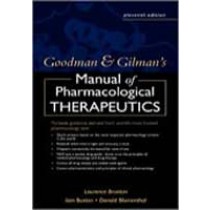
The Goodman and Gilman's Manual of Pharmacological Therapeutics
Specialty: Pharmacology,
Publisher: McGraw-Hill,
Publication Year: 2008,
Cover: Paperback
Weight: 0 KG
Learn MoreOMR6.93 -
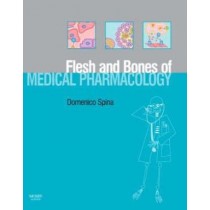
The Flesh and Bones of Medical Pharmacology
Pages: 152,
Specialty: Pharmacology,
Publisher: Elsevier,
Publication Year: 2008,
Cover: Paperback,
Dimensions: 220x274x12mm
This title presents a concise, accessible account of pharmacology, covering all the key concepts you need with no gaps. It can be used either as an introduction to a topic, or as a revision aid.
Weight: 0.62 KG
Learn MoreOMR15.02 -
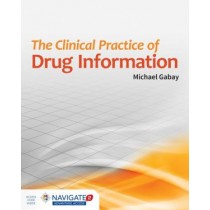
The Clinical Practice of Drug Information
Pages: 512,
Specialty: Pharmacology,
Publisher: Jones & Bartlett,
Publication Year: 2016,
Cover: Hardback,
Dimensions: 203.2x254x35.56mm
The Clinical Practice of Drug Information provides information on various resources, approaches to answering drug information requests, evaluating the biomedical literature, study design, statistical concepts, bioinformatics, medication safety, development of medication use policies, medication safety, formulary management, evidence-based medicine, and pharmacy informatics. This resources will educate students and pharmacists on traditional drug information topics while providing an extensive background on more recent practice areas. This is a user-friendly text with multiple examples that can be used in education and training, as well as clinical practice. Each chapter includes learning objectives, key terms, examples and cases, and review questions. Instructor Resources: Instructor's Manual, Slides in PowerPoint format, Test Bank Each new print copy includes Navigate 2 Advantage Access that unlocks a comprehensive and interactive eBook, student practice activities and assessments, and for instructors: a full suite of teaching tools, and learning analytics reporting.
Weight: 1.11 KG
Learn MoreOMR30.80 -

Target Topics: Pharmacology
Pages: 272,
Specialty: Pharmacology,
Publisher: McGraw-Hill,
Publication Year: 2019,
Cover: Paperback
Introducing the compact, essential pharmacology review students will reach for right before exam day This innovative new resource drills down to just the critical concepts needed to ace pharmacology course examinations and the USMLE Step 1. This must-have, portable study companion delivers all of the key pharmacology concepts in a quick-read, two-column "flashcard" Q&A format-one that's specifically designed to facilitate maximum retention in the least amount of time. Ideal for last-minute review and filled with contributions by medical students, the book provides a practical, sure-fire way to self-assess strengths and weaknesses prior to test time. *Focuses only on the crucial, need-to-know information for exam success*Two column Q&A format helps students work through questions instantly*Active recall questions allow students to understand, not just memorize, the content *Chapter-ending clinical vignettes offer useful preparation for board-style questions show more
Weight: 1 KG
Learn MoreOMR12.71



